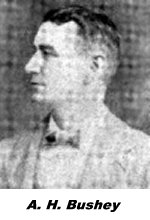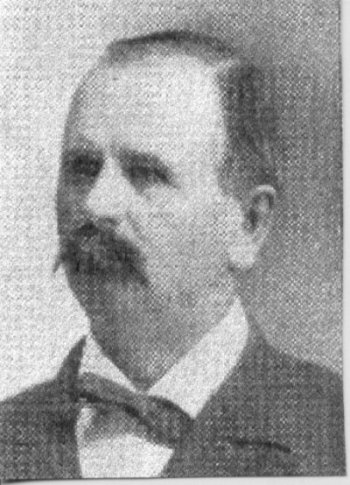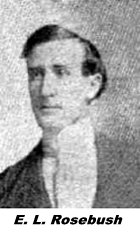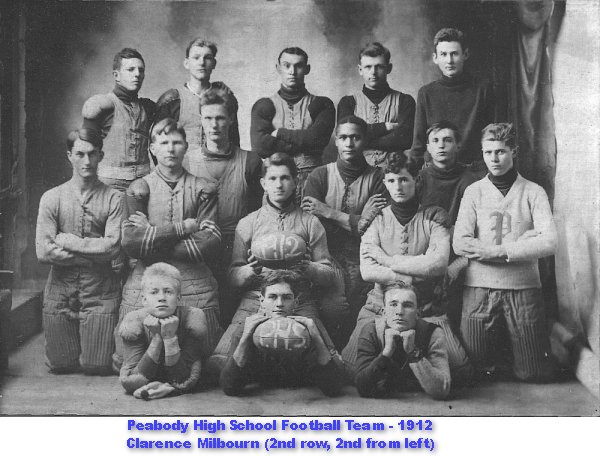


 Mr Knowles
Mr Knowles
U. G. MITCHELL
Principal of the Hillsboro Schools and one of our
Rising Young Men
AN ARTICLE EXTRACTED FROM THE PEABODY NEWS 1901
Contributed by Charmaine Keith (charmain@southwind.net) 26 August 1998
---------------------------------------------------------------------
---------------------------------------------------------------------
Peabody News
1901
The subject of this sketch was born Nov.
26, 1872 in Nashua, Iowa, and named Ulysses
Grant Mitchell. In 1885
his parents moved to Marion County and settled on a farm five miles
east of Peabody. Ulysses attended the Peabody schools five years and
graduated in 1892. He
then taught a country school at Braddock three
terms and afterward attended the State
University of Nebraska. He
completed his education by graduating from the Central Normal
College of Kansas at Great Bend with the degree of Bachelor of Arts. At
this place he also
held a position as instructor in German and
Mathematics for some time. In 1898 he was chosen
as principal of the
Hillsboro school, which position he has acceptably filled three years.
Following we publish a contribution on education which he furnished
by request:
KNOWLEDGE NOT POWER BUT CO-ORDINATE WITH IT
Our forefathers used to say, "Knowledge is Power." The statement
would seem to
indicate that the two are coincident. They are seldom,
if ever, so. It might mean that
knowledge and power, speaking
broadly, are different phases of the same activity, much as
cause
and effect are merged together into a single unity. In that sense it may
sometimes be
correct. But the truth is that the two have certain
points in common and are usually
concomitant and if the old adage
means more than that it is faulty.
There is a broad a
distinction, educationally, between knowledge and power as there
is
between science and art, and to see that distinction and recognize its
force at all times
in his work is highly essential to the educator.
The distinction, as it affects his work,
amounts to this, that while
every child possesses a certain natural and individual
capability
both of learning and of power to apply what he knows to the varying
circumstances
of environment, the one does not necessarily follow
the other and education can develop both
together or either at the
expense of the other. Education can not create; it can only
develop
natural capacity and that development should be harmonious. The true
education gives
knowledge but it gives with it commensurate power to
apply that knowledge to the
difficulties and forces of the world
which are to be met and grappled with. It must be
admitted that our
schools too often lay stress up on the importation of knowledge and
neglect the cultivation of power. Many a boy who has "gone through" a
complete arithmetic
and not only learned all the rules and
definition but also, as he proudly announces, "solved
every problem
in the book," is completely at sea when you give him a simple problem
which
requires nothing but the application of what he already knows
in a way that is slightly new.
Many a young lady who has finished
grammar can rattle off any definition pertaining to it
or model for
parsing that you may ask for, besides having had a course in higher
English and
another in rhetoric, when given a little stanza from
Longfellow or a sentence from Webster,
cannot name the principal
proposition or correctly place the clauses and phrases in their
relations to each other.
Many a high school student with full
three years of Latin, flattering himself that
he is quite a Latin
scholar, comes across a word of easy Latin derivation such as
"concatenate" which he has never seen before and it is a dead blank to
him. He knows well
enough that "con" means together and "catena"
chain, but just here where he needs them he
cannot put them in place
and see that the word literally means to chain together. Many a
classical college graduate, flushed with honors, believing that he is a
scholar, fully
equipped for a splendid career and that he is going
forth, "conquering and to conquer,"
suddenly thrown upon his
resources and compelled to make for himself what we common folk
call
"aliving" is about as helpless as if he were surrounded with the
necessary tools and
materials, which he has seen before but never
touched, and told that he must build by
himself a King's palace. He
is familiar, perhaps, with how a King's palace should look, he
has
seen the workmen handle the tools, but what sort of a palace do you thin
he would build?
Essentially similar are the failures of the boy
to grasp and unravel the problem,
the girl to interpret the sentence
and correlate its parts, the student to use his Latin
when
opportunity is presented and the college graduate to make a bare living
when necessity
required. We may be inclined to charge such failures
to meager capacity on the part of the
learner, but by no means it is
due to the deforming effects of one-sided educating. Such
teaching
is due to false standards, a desire to cover a great deal of ground and
to make
work "show off" well. But such questions may be asked, such
work may be assigned, such means
and methods generally may be
employed as will develop knowledge and power simultaneously and
harmoniously and may God help us teachers to find and use more of them
for the good of the
precious young lives entrusted for a time to our
guidance.
U. G. Mitchell,
Hillsboro, Kan., May 23, 1901

---------------------------------------------------------------------
---------------------------------------------------------------------
Letter of welcome from the Board of Education 1901 image
---------------------------------------------------------------------
---------------------------------------------------------------------
PROF. E. L. ROSEBUSH
Principal of the Florence Schools and a
Worker
AN ARTICLE EXTRACTED FROM THE PEABODY NEWS 1901
Contributed
by Charmaine Keith (charmain@southwind.net) 26 August 1998
---------------------------------------------------------------------
---------------------------------------------------------------------
PEABODY NEWS
1901
The picture below is not of a "fine auld
English gentleman." As you might suppose,
but of E. L. Rosebush, a
fine young man of modern ideas and exceptional merit. He is a man
of
action and an earnest student. By close application and earnest study he
has acquired an
education, which with his natural abilities fit him
for much higher positions than he
occupies as principal of the
Florence schools. But he believes that a place well filled is
but
his simple duty and gives his best efforts to doing good work in
Florence. He is
appreciated there and has now completed his second
year in that school, with prospects of
being called again.
The News asked him to contribute an article for this edition. With
modest apology
for its brevity and lack of preparation he submits
the following, which contains some ideas
worth careful
investigation:
Notice the tender plant that ventures to raise its
head against the cold winds of
April. How it sways with each unkind
gust; but between cold rain and truing days come
sunshine and balmy
breezes. Finally it has itself disciplined to the changes of weather.
Weather, too, has become more kind and the tender plant is now a
grown flower, strong in its
beauty and conscious of success. Life is
a struggle. The flower combated the external. The
pupil aided by the
teacher must fight the internal in order to command the external.
Teachers, talk plainly with you pupil about the struggles that you have
gone through. Many
of your pupils are now where you once were. Early
let them see that bad conduct is simply
lack of self-discipline, and
that you sympathize with them. Who are you that you may frown
and
scold and worry and say sarcastic things to your pupils for then failure
to measure up
to your exalted standard? Do you expect a pupil from
ten to sixteen years of age to acquire
what you have been collecting
for thirty years? I believe in the discipline of kindness and
fairness. Kindness is not effeminate, mistaken inactivity; it is often
stern reproof of some
times a good switching. Discipline a pupil
must have. You see that he gets it.
E. L. Rosebush,
Florence,
Kan., May 20, 1901

---------------------------------------------------------------------

Peabody High School Football Team 1912
---------------------------------------------------------------------
If you have questions, contributions, or problems with this site, email:
Coordinator - Rebecca Maloney
State Coordinator: Tom & Carolyn Ward
Asst. State Coordinators: Vacant
If you have questions or problems with this site, email the County Coordinator. Please to not ask for specfic research on your family. I am unable to do your personal research. I do not live in Kansas and do not have access to additional records.